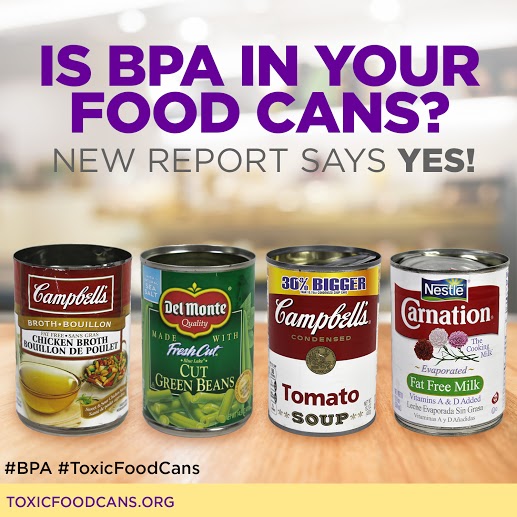There’s some bad news for those of us who thought BPA was a thing of the past.
A new report released today tested nearly 200 food can linings for the toxic chemical, Bisphenol A (BPA) and found that two out of three cans tested have the chemical in the lining. The report took a look at cans of vegetables, fruits, soups, broth, gravy, milks and beans from Campbell’s, Del Monte, General Mills, Kroger, Albertsons and more.
BPA is an endocrine-disrupting chemical that negatively impacts our hormonal systems. It can also contribute to breast and prostate cancer, infertility, type-2 diabetes, obesity, asthma and attention deficit disorder. Other studies have shown that BPA can migrate into food and then into people, raising concerns about low dose exposure.
For the first time ever, this report also took a look at the replacement materials for BPA in can linings, and to what extent their safety has been studied.
Here are some of the report findings:
- 100 percent of Campbell’s products sampled (15 of 15) contained BPA-based epoxy, while the company says they are making significant progress in its transition away from BPA.
- 71 percent of sample Del Monte cans (10 of 14) tested positive for BPA-based epoxy resins.
- 50 percent of sampled General Mills cans (six of 12, including Progresso) tested positive for BPA.
- BPA was found in private-label cans sold at both Target and Walmart, the largest grocery retailer in the United States. In their private label products, 100 percent of Target cans sampled (five out of five) and 88 percent of Walmart cans sampled (seven out of eight) tested positive for BPA-based epoxy resins.
Some good news:
- On the positive side, Amy’s Kitchen, Annie’s Homegrown (recently acquired by General Mills), Hain Celestial Group, and ConAgra have fully transitioned away from BPA and have disclosed the BPA alternatives they’re using. Eden Foods reported eliminating the use of BPA-based epoxy liners in 95 percent of its canned foods and stated that it is actively looking for alternatives. Whole Foods has clearly adopted the strongest policy of the retailers surveyed in the report. Whole Foods reports that store brand buyers are not currently accepting any new canned items with BPA in the lining material.
- Upon learning about this report, Campbell Soup Company agreed to switch to all BPA-Free packaging by 2017. While this is a step in the right direction we still don’t know what they’ll be using as a replacement liner. BPA-free isn’t enough.
What about the BPA alternatives?
The report found that retailers and brands that are phasing out BPA could be replacing it with substitutes that are just as toxic, if not worse. Unfortunately not much is known about the safety of these substitutes. Some of the retailers were lining the cans with a PVC-based copolymer that is made from a known human carcinogen. I think we can all agree that known and possible cancer causing materials don’t belong in a can liner that comes in contact with our food.
What can you do?
- Consumers should choose fresh or frozen foods, or only purchase canned food from manufacturers and retailers that fully disclose the identity and safety of their can linings. Look for food packaged in other materials such as glass and Tetra Pak containers.
- Demand that national brands, grocery stores, big box retailers and dollar stores eliminate and safely substitute BPA from all food packaging and label all chemicals used in can liners.
- Join the national online campaign calling on Kroger and Campbell’s to eliminate and safely substitute BPA.
Campbell Soup Company’s decision to switch to all BPA-Free packaging by 2017 is a step in the right direction. Hopefully other canned food retailers will follow their lead.
The question now becomes what will they switch to and will it be safer than BPA?
P.S. If you liked this post you might enjoy our Groovy Green Livin Newsletter. Receive new posts and special opportunities delivered right to your inbox! Sign up HERE.

